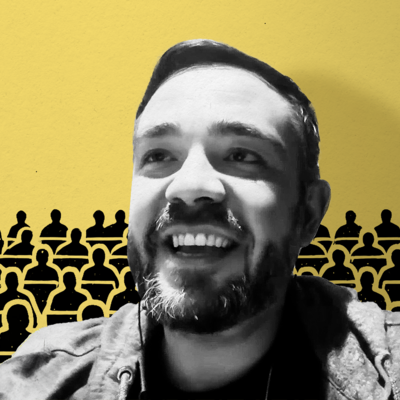
TL;DR: Today we’re releasing a new episode of our podcast AI & I. I go in depth with Nabeel Hyatt, a general partner at Spark Capital. We get into the qualities shared by remarkable products and the teams that build them. Watch on X or YouTube, or listen on Spotify or Apple Podcasts.
Was this newsletter forwarded to you? Sign up to get it in your inbox.
As a general partner at Spark Capital, Nabeel Hyatt backs just one or two companies each year.
But when he does invest, Nabeel picks winners. He was an early investor in Discord, video editor Descript, self-driving startup Cruise (acquired by General Motor for over $1 billion), and, recently, AI note-taking app Granola.
Nabeel’s investment thesis is to look for products like the Japanese toilet.
Don’t fret—Spark Capital hasn’t pivoted into the sanitaryware industry. Nabeel isn’t looking for startups that are disrupting plumbing.
Rather, just like Japanese toilets, he’s looking for products that delight users with new experiences they didn’t know they wanted—and if his past investments are anything to go by, Nabeel has a good eye for that.
On my recent trip to San Francisco, I sat down with Nabeel to talk about the qualities shared by remarkable products and the founders that build them, why he chooses not to invest in more than a couple of startups a year, and how he’s actually using AI in his daily life. Nabeel is one of my favorite people in AI, and this is one of my favorite recent conversations. It’s a must watch for founders who want to build useful AI products with soul. Here's a link to the episode transcript.
Watch on X or YouTube, or listen on Spotify or Apple Podcasts.
If you want a quick summary, here’s a taste for paying subscribers:
Why Nabeel only invests in a couple of companies a year
The first sentence on Spark Capital’s website—stretched across the page in a sharp, angular typeface—is: “We know there are no playbooks, rulebooks, or formulas.” The idea that there is no blueprint for success in startups is core to Nabeel’s investment strategy. He believes that the journey of every founder is unique, and to appreciate its nuances, you have to be in the murky details with them. Nabeel’s commitment to this belief organically limits the number of companies he invests in. “The proxy is if you’re a startup CEO or running a small org, you can manage eight or nine reports where you understand everything they’re doing, and outside of that, the edges get fuzzy,” he says.
Speaking to the risk of betting on fewer companies than the typical VC, Nabeel explains that the entire point of venture capital is risk: “The whole point of this thing is risk, accept the risk and go do the work you want to do with good people.”
What qualities remarkable founders share
Investing in a few companies comes with the responsibility of choosing them well. When evaluating potential opportunities, Nabeel describes three ways in which innovation shows up in the real world (inspired by ad executive Rory Sutherland):
- “Faster horses,” faster ways of doing something that already exists
- “Teleportation,” making something new that people want but don’t know how to get
- “Japanese toilets,” an unexpected, compelling solution that people didn’t know they wanted.
His recent investment in Granola falls within the last category. It’s not the first AI notetaking app to exist, but the product gives users an intuitive, delightful experience. “I’m wandering around and trying to find the Japanese toilets of AI,” he adds.
The Japanese toilets of AI—or useful products with soul—are built by startups that balance listening for feedback with action. Nabeel describes a spectrum where some founders are highly attuned to feedback but hesitant to act, while others are filled with energy but ignorant of feedback. Having invested in founders like Chris Pedregal from note-taking app Granola, and Andrew Mason from Descript, he says that they “move while listening.” The patterns Nabeel has noticed in pitches from these kinds of founders is “that they’re telling you insightful reasons why they put things into the product that you would have never normally thought of from customer development calls.”
How AI helps Nabeel explore unlikely pursuits
Nabeel is a venture capitalist, parent, and avid board game enthusiast—and AI has broadened the horizon of things he can do. He’s working harder than ever at Spark Capital, building a card game with his kids, and opening a board game library in San Francisco, a physical space dedicated to playing games.
The interesting thing is that some of these projects—like the board game library—have nothing to do with technology, let alone AI. Still, Nabeel explains that AI has made it easier to set up the library. The tools he’s used so far are:
- OpenAI’s o1 pro as a legal advisor to review drafts of a lease agreement
- Claude and AI code editor Windsurf to create simple apps, like to predict how many customers might visit and what prices they’d be willing to play
Why AI should rise above quick answers
Nabeel talks about the need for systems that provide an overview of the subject area in which they’re prompted, rather than jumping straight to solutions. In other words, an AI optimized to provide context that will help users make decisions, instead of simply providing very specific answers as fast as possible. He describes a side project he built using Wordware, a platform for deploying LLM applications and Spark Capital portfolio company: a tool to help founders make decisions. Nabeel trained the AI on specific knowledge regarding best practices in decision theory. When prompted, the tool will present users with three or four relevant decision-making frameworks, make a recommendation, and guide them through implementing the chosen method. “Help me learn from the things other people have used to structure whatever discipline they have been working on for a hundred or two hundred years,” he explains.
How to know when you can trust LLMs
When deciding whether to trust the AI he’s working with, Nabeel approaches it much like he would a human. He asks the model how confident it is in its answer and prompts it for reasons on why it could be both right and wrong. “That usually gives me enough information, which, proxying back to human behavior, if you don't understand something, get somebody to explain their logic around it a little bit more and you can kind of try to figure out whether they made an error or not,” he says.
You can check out the episode on X, Spotify, Apple Podcasts, or YouTube. Links and timestamps are below:
- Watch on X
- Watch on YouTube
- Listen on Spotify (make sure to follow to help us rank!)
- Listen on Apple Podcasts
Timestamps:
- Introduction: 00:01:32
- Why Nabeel doesn’t invest in more than two companies per year: 00:01:50
- Why the words you use to describe your business matter: 00:06:49
- What a product with soul looks like: 00:13:45
- Patterns in the remarkable founders Nabeel has invested in: 00:16:48
- How Nabeel evaluates popular coding agents: 00:24:12
- AI has broadened the horizons of what Nabeel can do: 00:32:29
- How funding models are changing as AI makes it cheaper to build software: 00:36:28
- Nabeel’s framework for when to trust an LLM: 00:45:43
- Guide AI to provide context (and not just quick answers): 00:55:39
What do you use AI for? Have you found any interesting or surprising use cases? We want to hear from you—and we might even interview you. Reply here to talk to me!
Miss an episode? Catch up on my recent conversations with star podcaster Dwarkesh Patel, LinkedIn cofounder Reid Hoffman, a16z Podcast host Steph Smith, economist Tyler Cowen, writer and entrepreneur David Perell, founder and newsletter operator Ben Tossell, and others, and learn how they use AI to think, create, and relate.
If you’re enjoying my work, here are a few things I recommend:
- Subscribe to Every
- Follow me on X
- Subscribe to Every’s YouTube channel
Thanks to Rhea Purohit for editorial support.
Dan Shipper is the cofounder and CEO of Every, where he writes the Chain of Thought column and hosts the podcast AI & I. You can follow him on X at @danshipper and on LinkedIn, and Every on X at @every and on LinkedIn.
We also build AI tools for readers like you. Automate repeat writing with Spiral. Organize files automatically with Sparkle. Write something great with Lex. Deliver yourself from email with Cora.
Get paid for sharing Every with your friends. Join our referral program.
The Only Subscription
You Need to
Stay at the
Edge of AI
The essential toolkit for those shaping the future
"This might be the best value you
can get from an AI subscription."
- Jay S.
Join 100,000+ leaders, builders, and innovators

Email address
Already have an account? Sign in
What is included in a subscription?
Daily insights from AI pioneers + early access to powerful AI tools










.png)
Comments
Don't have an account? Sign up!